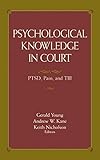Psychological Knowledge in Court : PTSD, Pain, and TBI / edited by Gerald Young, Keith Nicholson, Andrew W. Kane.
Tipo de material: TextoEditor: Boston, MA : Springer US, 2006Descripción: XV, 412 páginas, 12 illus. recurso en líneaTipo de contenido:
TextoEditor: Boston, MA : Springer US, 2006Descripción: XV, 412 páginas, 12 illus. recurso en líneaTipo de contenido: - texto
- computadora
- recurso en línea
- 9780387256108
- BF61
Springer eBooks
to Psychological Knowledge in Court: PTSD, Pain, and TBI -- Psychology, Causality, and Court -- PTSD/Distress -- Understanding PTSD: Implications for Court -- Posttraumatic Disorders Following Injury: Assessment and Other Methodological Considerations -- Predicting Who Will Develop Posttraumatic Stress Disorder -- Assessment of Psychological Distress and Disability After Sexual Assault in Adults -- Chronic Pain -- Pain in the 21st Century: The Neuromatrix and Beyond -- Influence of Personality Characteristics of Pain Patients: Implications for Causality in Pain -- Effect of Cognition on Pain Experience and Pain Behavior: Diathesis-Stress and the Causal Conundrum -- Chronic Pain and Affect as a Nonlinear Dynamical System -- Objective and Subjective Measurement of Pain: Current Approaches for Forensic Applications -- PTSD and Pain -- Posttraumatic Stress Disorder and Whiplash After Motor Vehicle Accidents -- PTSD and Chronic Pain: Cognitive-Behavioral Perspectives and Practical Implications -- Comorbid Chronic Pain and Posttraumatic Stress Disorder Across the Lifespan: A Review of Theoretical Models -- Traumatic Brain Injury -- Mild Traumatic Brain Injury: Definitions -- Mild Traumatic Brain Injury: Neuropsychological Causality Modelling -- Mild Traumatic Brain Injury: Causality Considerations from a Neuroimaging and Neuropathology Perspective -- Confounding Effects of Pain, Psychoemotional Problems or Psychiatric Disorder, Premorbid Ability Structure, and Motivational or Other Factors on Neuropsychological Test Performance -- Neuropsychological Assessment of Moderate to Severe Traumatic Brain Injury -- Conclusions -- Conclusions on Psychological Knowledge in Court: PTSD, Pain, and TBI.
PTSD, pain syndromes, traumatic brain injury: these three areas are common features of personal injury cases, often forming the cornerstone of expert testimony. Yet their complex interplay in an individual can make evaluation—and explaining the results in court—extremely difficult. Psychological Knowledge in Court focuses on this triad separately and in combination, creating a unique guide to forensic evaluations that fulfills both legal and clinical standards. Its meticulous review of the literature identifies and provides clear guidelines for addressing core issues in causality, chronicity, and assessment, such as: - Are there any definable risk factors for PTSD? - How prevalent is PTSD after trauma? - How do patients’ emotions relate to their pain experience? - Are current pain assessment methods accurate enough? - What is the role of pre-existing vulnerabilities in traumatic brain injury? - What exactly is "mild" TBI?
Para consulta fuera de la UANL se requiere clave de acceso remoto.


